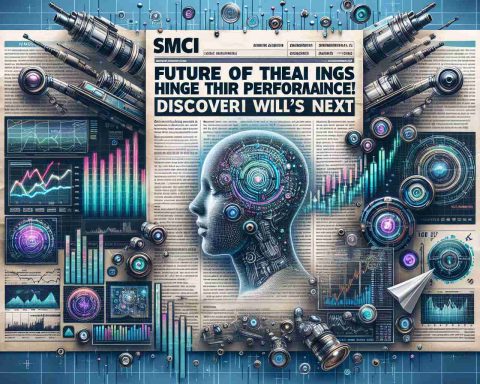As the world’s leading semiconductor manufacturer, Taiwan Semiconductor Manufacturing Company (TSMC) continues to capture the attention of investors. Recent advancements in Artificial Intelligence (AI) are creating an even greater buzz around TSMC’s stock, suggesting a potentially transformative impact on its valuation.
TSMC’s strategic embrace of AI technologies presents groundbreaking opportunities for future growth. With AI-driven design tools enhancing semiconductor efficiency and performance, TSMC is poised to increase production fidelity and expedite time-to-market for its cutting-edge chips. This technological breakthrough could significantly boost TSMC’s competitive edge, attracting a wave of new clients and expanding market share—events that typically excite investor interest.
Another important factor is TSMC’s role in supporting the AI industry itself. As AI applications proliferate, demand for TSMC’s high-performance chips is expected to skyrocket. The nascent AI markets—spanning autonomous vehicles, machine learning, and Internet of Things (IoT) devices—require increasingly sophisticated hardware, setting the stage for TSMC’s continued dominance in the semiconductor industry.
However, with increased geopolitical tensions affecting global supply chains, investors should remain vigilant. Any disruption therein could temper TSMC’s growth trajectory, posing a risk to stock performance.
In summary, TSMC’s integration of AI technologies injects renewed optimism into its stock outlook. The long-term prospects are promising, driven by heightened demand and innovative production methodologies. Investors keen on future-proof portfolios are closely watching TSMC’s evolving narrative in this tech-forward era.
AI-Enhanced Semiconductor Manufacturing: A Catalyst for Change
The integration of Artificial Intelligence (AI) into semiconductor manufacturing, as exemplified by Taiwan Semiconductor Manufacturing Company (TSMC), has profound implications not only for the tech industry but also for the environment, humanity, the economy, and the future of our world. At the crux of this transformation lies the role AI plays in reshaping manufacturing processes, driving innovation, and responding to the rapid growth in technological demands.
One of the most significant environmental impacts of AI-enhanced semiconductor manufacturing is its potential to reduce waste and energy consumption. AI-driven design tools can optimize chip design and production, leading to more efficient use of resources and less environmental footprint. The ability of AI algorithms to predict and rectify design flaws before production ensures lower material wastage, aligning with global sustainability goals. By advancing toward more sustainable manufacturing methods, companies like TSMC not only improve their environmental credentials but also contribute to broader climate change initiatives.
On a human level, the proliferation of AI technologies supported by advanced semiconductors promises to revolutionize how we live and work. From autonomous vehicles that could reduce traffic accidents and emissions, to improved healthcare diagnostics powered by machine learning, AI-enhanced semiconductors are at the heart of innovations that could lead to a safer, healthier future. However, this rapid technological advancement also poses challenges, such as the displacement of jobs due to automation and the ethical concerns surrounding AI’s role in society. Addressing these challenges will require thoughtful policy and regulation to ensure that technology serves the common good.
Economically, TSMC’s advancements in AI-enhanced semiconductor manufacturing are poised to bolster not only the company’s market position but also the global economy. The demand for sophisticated semiconductors in AI markets—ranging from the Internet of Things (IoT) to machine learning—spurs economic growth by driving investment and innovation. Yet, this growth can be jeopardized by geopolitical tensions that threaten global supply chains. Stability in this sector is crucial for maintaining economic momentum and ensuring that the benefits of technological advancements are widely distributed.
Looking to the future, the role of semiconductors in AI development has significant implications for humanity. As AI-driven technologies become increasingly integrated into daily life, semiconductors will continue to evolve, becoming more efficient and powerful. This evolution necessitates a global effort to ensure equitable access to technology and the responsible use of AI. The lessons learned from integrating AI into semiconductor manufacturing will be pivotal as society navigates the challenges and opportunities presented by a future where AI is ubiquitous.
In conclusion, the integration of AI technologies into semiconductor manufacturing marks a transformative era that holds the potential to significantly impact the environment, reshape economies, and redefine human experiences. As companies like TSMC lead this evolution, it is essential to balance the drive for innovation with the responsibility to ensure a sustainable and equitable future for all.
TSMC’s AI Revolution: A Game-Changer for the Semiconductor Industry?
In an era where Artificial Intelligence (AI) is redefining technological landscapes, Taiwan Semiconductor Manufacturing Company (TSMC) stands at the forefront of innovation, drawing investor interest with its dynamic approach. Here’s a deep dive into the new facets shaping TSMC’s journey in AI inclusion and market impact.
AI-Powered Innovations at TSMC
TSMC’s seamless integration of AI technologies offers transformative potential in the semiconductor sector. By implementing AI-driven design tools, TSMC is not just boosting semiconductor efficiency but setting new industry standards in production fidelity and market readiness. These cutting-edge methodologies enhance the competitive positioning of TSMC’s products, promising expanded client portfolios and bolstered market dominance.
Market Dynamics and Future Trends
As AI technologies gain traction, TSMC’s capabilities in delivering high-performance chips cater to burgeoning markets, including autonomous vehicles, machine learning, and IoT applications. The rising demand for sophisticated hardware to support AI functions aligns perfectly with TSMC’s strategic positioning, suggesting robust growth prospects.
Security and Geopolitical Considerations
Despite a promising outlook, TSMC must navigate intricate geopolitical landscapes influencing global supply chains. Investors remain cautious of potential disruptions that could impact the supply and demand dynamics, thereby influencing TSMC’s stock performance. Mitigation strategies and resilient operation models are imperative to safeguarding its trajectory.
Pros and Cons of TSMC’s AI Strategy
Pros:
– Enhanced chip production efficiency.
– Expanded client base and market share.
– Leadership in fast-growing AI-driven markets.
Cons:
– Susceptibility to geopolitical tensions.
– Reliance on global supply chain stability.
Predictions for TSMC’s AI-Inspired Growth
Looking ahead, TSMC is expected to strengthen its market leadership by continuously innovating AI solutions within semiconductor production. The company’s commitment to sustainability and efficiency positions it well to capitalize on future industry shifts, offering potential growth for investors targeting tech-forward investment avenues.
Conclusion
TSMC’s foray into AI not only enhances its product offerings but also positions it strategically to capture emerging opportunities in the tech sector. As it navigates the complexities of global trade, the company’s resilience and innovation remain focal points for those considering its stock as a top contender in future-proof investment portfolios.
For more insights into how TSMC is shaping the future of semiconductors, visit the company’s official page at TSMC.




















